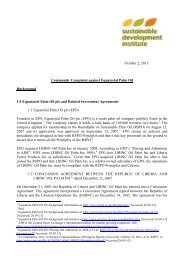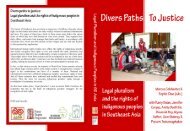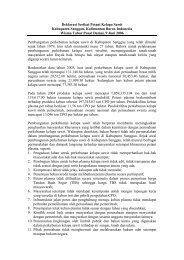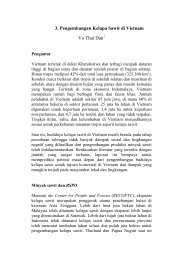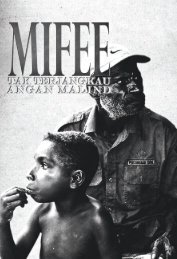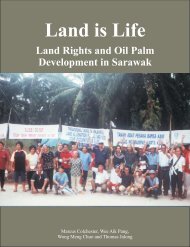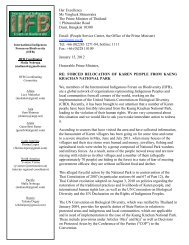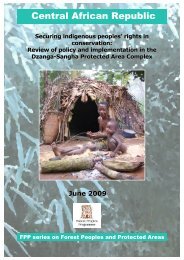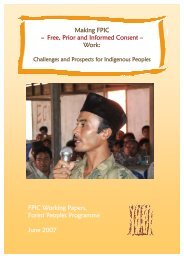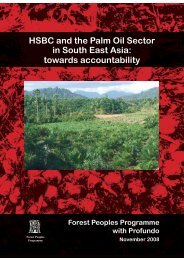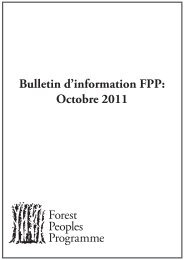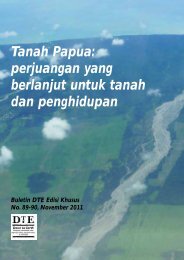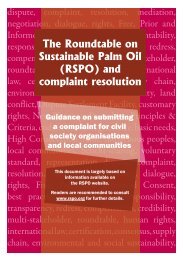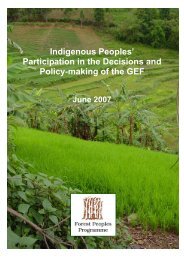The Upper Caura, Venezuela - Forest Peoples Programme
The Upper Caura, Venezuela - Forest Peoples Programme
The Upper Caura, Venezuela - Forest Peoples Programme
You also want an ePaper? Increase the reach of your titles
YUMPU automatically turns print PDFs into web optimized ePapers that Google loves.
Protecting and encouraging customary use of biological resources: <strong>The</strong> <strong>Upper</strong> <strong>Caura</strong>, <strong>Venezuela</strong>_________________________________________________________________________________________Polities and jurisdictionsYe’kwana society is profoundly egalitarian, although leadership roles are recognised and theauthority of the village ‘headman’ (Kajiichana) respected, his power is strictly limited. AYe’kwana headman consolidates his power through the kinship network, recruiting supportby influencing marriages so that his village will be strengthened and stabilised by gainingyoung sons-in-law who will move into the village to be with their wives. Central to Ye’kwanaperceptions of social life is the concept of the village as an enduring, undivided and unitaryentity that is substantially independent of other communities. 18<strong>The</strong> headman of the community gives it leadership and has the duty of mediating alltransactions and trade with outsiders. He is expected to appoint a deputy. Formal meetingsof the council of elders (Inchonkomo) are preceded by conferences between the headmanand his deputy and then community decisions are achieved by consensus. By this means astrong sense of common purpose and community solidarity is, ideally, achieved. 19 Formally,however, the headman has few powers to enforce his will on community members whochoose not to follow collective decisions, and the main sanctions on misbehaviour comethrough peer disapproval, publicly voiced criticism, ostracism and, in some regions, thewithdrawal of food-sharing.However, the day to day authority of the headman, and the council of elders he is able torecruit about himself, is complemented uneasily by the role of the shaman (jü´wai) whosespiritual authority and power is feared and respected. Ye’kwana shamans play a veryinfluential role in the making of strategic decisions about resource use, notably in advisingon when villages should relocate, which sacred areas should be avoided and which areas arefavourable for new settlements. 20In addition to the village level authorities, the Ye’kwana also have a higher level bodyknown as the Öyaamö, which brings together the headmen of several villages. Customarilyactive only when villages in defined areas feel the need to jointly confront serious problems,such as illness and warfare, the Öyaamö has recently re-emerged as a critical institution fordealing with the national society (see below).Sanema social norms vest even less power in their headmen (kaikana). Indeed the veryword for a village headman has only recently been adopted from the Ye’kwana. Villagesrecruit members agnatically and headmen are considered to represent particular descentgroups rather than communities. When communities meet for feasts and funerals, politicalrelations are established bilaterally between many different men of the different villagesthrough ritual dialogues (wasamo) in which the men pair up and competitively engage inword exchanges using a special language only used for this purpose. A headman has noauthority to punish another person for misbehaviour instead can only challenge miscreantsto formalised duels in which antagonists exchange an even number of blows. Strict equalitybetween the headman and other members of the community is thus maintained. Althoughdecisions are often reached by conferences of all concerned elders (pata töpö), consensus is18 Nelly Arvelo-Jimenez, 1971, Political Relations in a Tribal Society: a study of the Yecuana Indians of<strong>Venezuela</strong>. Latin America Studies <strong>Programme</strong>, Document 31, Cornell University.19 Ibid.20 David Guss, 1986, Keeping it Oral: a Yekuana Ethnology. American Ethnologist 13: 413-429. ‘InAmazonian indigenous societies, where shamans are also political leaders, their power is of an economicnature insofar as their ritual knowledge is considered indispensable to ensure the success of productiveand reproductive activities.’ (266).25



